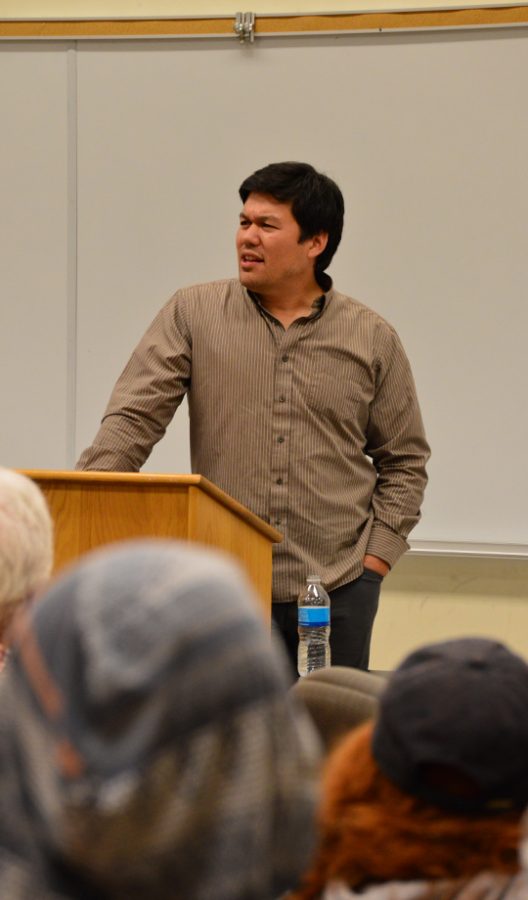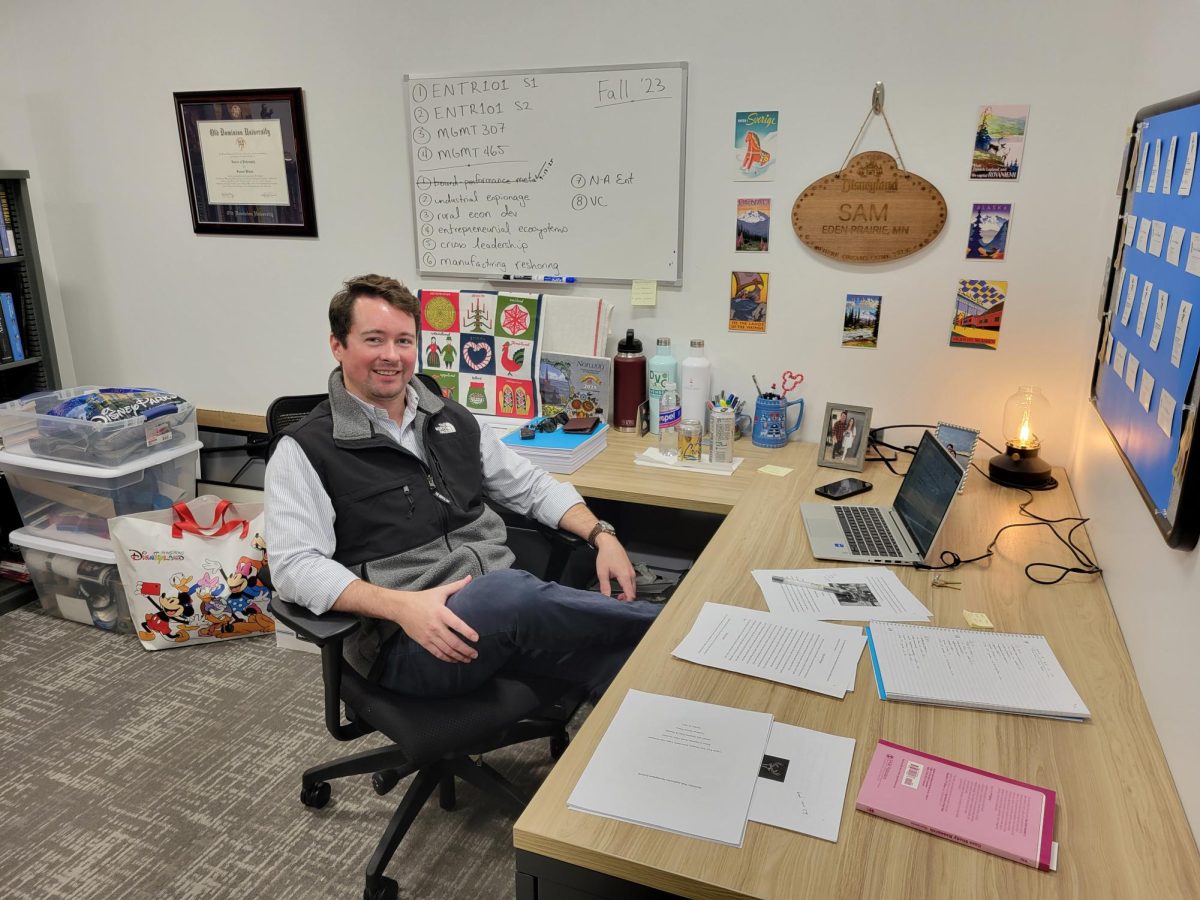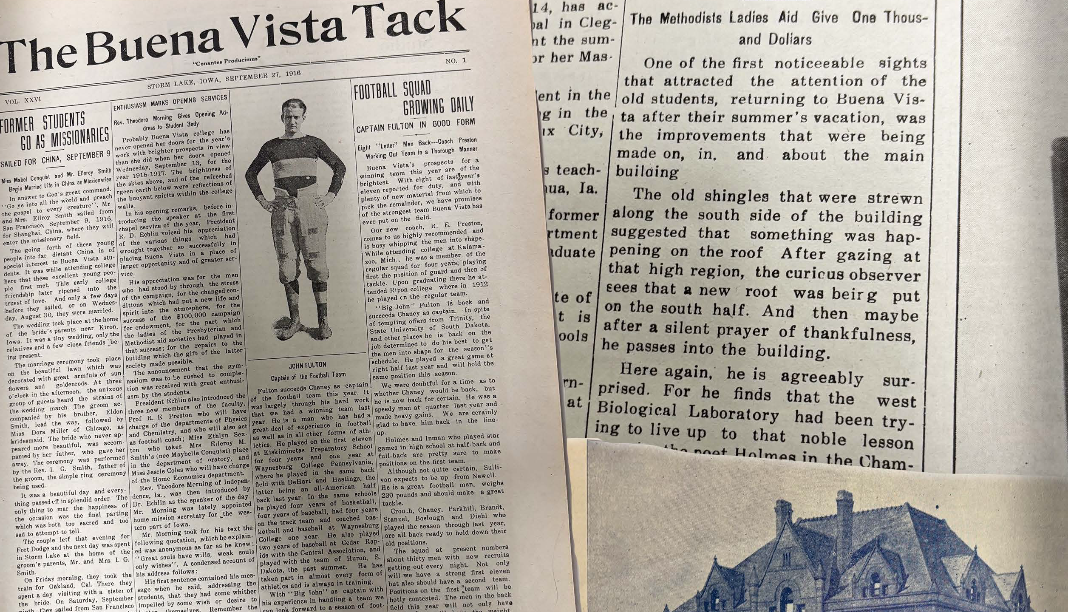Iowa Author Educates with New Book: “We Could’ve Been Happy Here”
October 13, 2017
Being a writer is maddening at first. You look for advice, tips, tricks, or anything that will truly grant you access to your own creative brilliance. That is, if you believe you have creative brilliance. Writers constantly seek community. It comes as little surprise that when an author comes to campus, the inspired writers flock to hear anything that might grant them a peek into the profession they aspire to go into.
Keith Lesmeister was one such author. Lesmeister spent two days in Storm Lake exploring the campus and doing a reading of his new collection of short stories, We Could’ve Been Happy Here, for an ACES event, as well as speaking to Gwen Hart’s Advanced Composition class about the publishing world.
To say the reading was informal would be an understatement, but that was part of the charm. He started as all nervous presenters begin with stories and jokes, but eventually he seemed at ease among the students. As a teacher himself, the classroom was not a foreign field of on lookers, and contained interested minds searching for entertainment. He seemed happy to oblige.
Lesmeister started by talking about his drive, demonstrating in his description how he can take a simple observation at a Sinclair’s station and turn it into something interesting. Then he spoke a little about his Iowa upbringing. Born and raised in Cedar Rapids Iowa, he demonstrated through his words how his family inspired his first ideas about writing.
The packed ACES lecture hall listened with rapt attention. He read the title narrative of his short story collection, which follows the story of an addict detoxing while he’s farm sitting in the middle of nowhere. The story, like many in his book, painted pictures of rural life, family life, warts and all.
After the reading, hands went up and people asked questions such as, “Are the stories based on people’s lives?” The short answer is no. Though with all writers, there are bits and pieces that are inspired by his life. They ask him what the most difficult things are about being a writer. “Pretty much everything,” he answers.
He talks about the dedication it takes to write, how going out with friends and sleeping in until 8 would be great, but instead he gets up at 5:30 because it’s become his routine. They ask him why he writes about the Midwest, and he responds, “I really think it’s a wonderful, wonderful place with its own sort of rich stories and mythologies.”
They ask him about the critics and the worst criticism he’s ever gotten, and his answer is philosophical. “What I’ve discovered is I almost like the harsher reviews more than the ones that are gushy, flowery. I’m serious. I say that because when somebody offers you a critique of the book, that means they really have taken time to sit with it and think about it. Which means they’ve highly invested in the book. That’s a pretty cool thing…I really think that criticism has its own kind of flattery.” He says they have to be resilient, if they want to write.
Lesmeister didn’t start out dreaming of being a writer. He didn’t even consider it as a possibility, that people didn’t grow up to be writers. When he went to college, he was focused on sports and football. Teaching and writing weren’t initially on his radar, but he started thinking about writing because he wanted to document family history. He wanted to make a record of the things that happened at family reunions, stories about the wild things that would happen.
That eventually morphed into an interest in writing a memoir. However, he wasn’t sure that he was ready to share those stories with the world. Regardless, he kept writing, but started working on fiction. After taking a fiction writing class, he developed a taste for short stories. Lesmeister credits a short story called White Angel by Michael Cunningham, among others, with really inspiring him to write short stories.
When he sits down with the Advanced Composition class, the writing questions are pulled to the forefront. Some in the room want to know about publishing, others want to know about development of stories. He explains the purpose of some of his characters, how some of them were there, in his mind, from the beginning and how others just came as an afterthought.
He goes into detail about how he takes things that happen in his life, little snippets of a day, and builds a scene out of it in his head. He pushes it, expands upon it, changes places, names, countries and makes up events preceding it and following it. All to create compelling fiction.
One of the students asks about publishing. He tells them about his process, what publishing We Could’ve Been Happy Here was like. He tells them that if they are interested in getting their work out there, they could try looking in the back of The Best American Short Stories Anthology, look at the reviews and journals who submit to it and perhaps try to send in to those publications.
“Send to places that you think it (your writing) will be a good fit,” he explains.
Lesmeister describes publishing as the most mysterious and arbitrary things. He says he didn’t understand it when he was younger, and he still doesn’t understand it, even now.
After the class, Lesmeister agreed to speak with me. We walk down the hall to a lounge outside Professor Hart’s office. Two days of talking, tours, interviews, and readings, and he was still energetic and willing to have a conversation. He describes that he hadn’t really considered writing when he was young, and I inquired if teaching had always been part of the plan.
“I didn’t really know what I wanted, I especially didn’t know that writing was an option to me until I was in my upper twenties and into my early thirties really. I didn’t realize that this would be an option, as a lifestyle, both the writing and the teaching. You don’t grow up thinking about this as an occupation… you think about teaching certainly, but not necessarily about making a career, or a life, as a writer. That idea when it came to me felt very fresh and new, and interesting. I thought this is exactly what I’m looking for.”
I also asked of him why he chose short stories as his medium of choice.
“Really it’s because it’s what I love to read. It’s what I love to write. I really never read a short story until I was in my upper twenties and once I read the White Angel story, that kind of got me started. Once I read that I thought, this! I want to try and do something like this. It was just such a beautiful rendering of this relationship between two brothers. The sentences and the language was just perfect. It really had an emotional effect on me. You know, I was moved, really emotionally moved by the story and it, more so than anything else I’ve ever read… If I could attempt to do something even half this good I would be very satisfied with myself.”
Next, we talked about the process. All writers have a process and everyone enjoys something different about it, so I asked Lesmeister what his favorite part was.
“When I first started as a writer I really loved the adrenaline rush of getting a first draft on the page. That first draft, there’s something really magical about it. But now as I’ve developed as a short story writer, what I’m mostly interested in is the revision process. It sounds very tedious, but there’s something that I really love about rereading a story and finding (places) to tweak the sentences, places that I need to add description or dialogue.”
How somebody writes can vary as much as what we each find appealing about writing. Some lay out the bones and built on draft after draft. Others dump out everything onto the page and trim down as they go. Lesmeister fell somewhere in between, dumping out his subject and then building upon it until the entire draft is finished.
Lesmeister sometimes goes through dozens, and on one story, fifty or more of these drafts were revised until he is finished.
Earlier, he told the composition class to “Focus on creating the best work possible, because I think good work will always rise. I really do. If you focus on making the work as good as it can be you’re going to find a home for it somewhere.”
“You used the word journey to describe that and I think that’s exactly what it is. Think of it as a long journey, don’t think of it as something that you’re going to start and come back to, but think of it as something that you’re on constantly. Also, just let me veer into some very practical advice. Try to write every day. Read what you want to write. If you want to write poetry, you should be reading poetry. If you want to write novels, you should be reading novels. If you want to write short stories, you should be reading a lot of short stories. When you’re first starting out, I think it’s important to try and emulate someone you really like. There’s nothing wrong with that at all. That’s how I started out, sort of trying to write stories like my favorite authors. Outside of that, persistence, doggedness, self-discipline and really sticking with it. It’s not going to be easy. There are going to be a zillion other things you’d rather do with your time like watching Game of Thrones, playing basketball with your friends, watching movies or going out; but your job as a writer is to say no to those things, so you can get the work done.”
Lesmeister is currently working on more short stories. His book, We Could’ve Been Happy Here can be found wherever books are sold.







